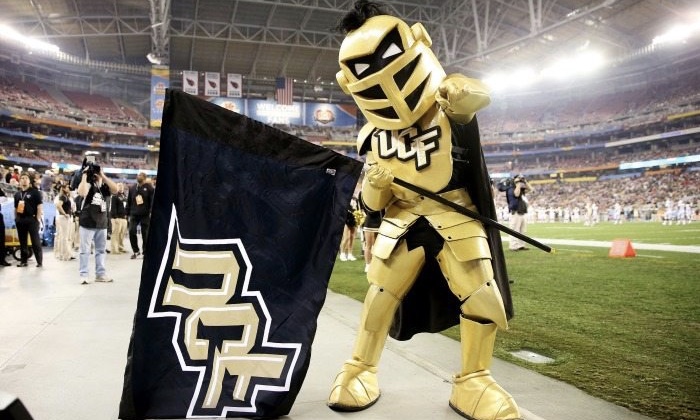I’ve had enough. It’s been over two years and the fanbase of UCF and their advocates *ahem, Clemson Carl* *ahem, Andy Jones* continue to scream from the mountain tops that they are a championship team. They have gone so far as to create a fake championship banner, as well as rings. I have a replica of the Rays 2008 American League Championship ring, but that doesn’t make me an AL Champion.
So why do voters continue to pass on UCF?
First things first. Let’s take UCFs resume and compare them to some of the most successful non-P5 teams prior to moving to a Power 5 conference. I sampled what they did four years prior to moving, as well as long term history. This ranges from 9-15 years, but mostly within the 10-year range.
Resume Game

*Team D 11+ win seasons in last 10 years.

Any guesses? Check your answers.
- TCU = Team A
- Utah = Team B
- West Virginia = Team C
- Louisville = Team D
- UCF = Team E
UCF has the worst resume both in small and large sample sizes, and despite the opinions of many of its advocates, a two year–hell even a three year–sample isn’t enough to accurately determine anything. Four years is a bare-bone minimum, and still probably doesn’t tell the whole story.
Here’s why these variables mean so much to UCF and the committee:
vs Power 5 and Ranked Teams
The hot topic of Week 3 is how UCF demolished Stanford, and how this makes them championship material. Several questions came to mind when trying to put this together.
- First things first, how does UCF do against Power 5 teams?
- Secondly, how do they do against Power 5 teams that finished with a record above .500?
- How do they do against teams who finished in the Top 25?
- At the time, how do they compare to the other top Non-P5 teams?
- How did those teams fare once they moved to a Power 5 conference?
Those answers are located in the charts above, but let’s take another quick look…
vs Ranked Teams
- TCU: 7-18
- Utah: 6-19
- West Virginia: 4-20
- Louisville: 1-15
vs Power 5 Teams (Power 5 Teams > .500 Win %)
- TCU: 45-32 (23-28)
- Utah: 40-40 (14-34)
- West Virginia: 39-37 (14-33)
- Louisville: 26-26 (11-24)
The winning percentage against Power 5 teams that finished above .500 and ranked teams took a pretty big hit, except for Louisville who already had a sub .500 record to begin with. The increase of Power 5 and ranked games proved too much for these programs at times. Like a lot of schools, they leaned on beating bad teams in their conference and a soft OOC schedule to keep them afloat. Who’s to say that UCF won’t have the same fate? What makes them so special that they’ll do better than these other teams?
So when we’re quick to say that a team like UCF can go all out on these ranked teams or these tough Power 5 teams, remember that. The going gets tough when you’re prepping for eleven Power 5 opponents, 5 or 6 of whom may be filled with top tier talent. Meanwhile, UCF finds themselves in a competitive AAC, which includes opponents such as Tulane, Memphis and USF, however, the conference doesn’t hold a candle to any of the P5 conferences. That provides a nifty little segue.
Strength of Schedule: Words to Start a Riot
Of course, there is another correlation between SOS and how a team performs when they switch conferences. For the teams previously mentioned, it was no surprise to see that the win percentage drops when they moved to tougher conferences. The tough teams are better, the average teams are better, and even the bad teams are better than what you’ve seen. Competition is different. Look at the total win percentage before and after they moved conferences as well as SOS before and after.
Win % Before and After
- TCU – 81.7%; 63.7%
- Utah – 75%; 60.2%
- West Virginia – 74.2%; 57.3%
- Louisville – 67.6%; 56.3%
SOS Before and After
- TCU – 83rd; 42nd
- Utah – 72nd; 37th
- West Virginia – 53rd; 41st
- Louisville – 68th; 39th
Winning is haaaarrrdd. It’s impressive these programs have been able to stay winning for the most part, but let’s not ignore the albeit slight drop-off.
Importance of Recruiting
When it comes to recruiting, UCF is outperformed largely on that scale, even before the other teams shacked up with the big boys.
Before and After
- TCU- 53rd; 31st
- Utah- 61st; 42nd
- West Virginia- 42nd; 38th
- Louisville- 44th; 36th
- UCF- 66th
Guess how many Power 5 conference championships the four teams above have won? Zero. TCU made it to the conference championship in 2017 and got pounded by Oklahoma, 41-17, another program that heavily out-recruited Alabama. Utah also made it to the conference championship last year and scored a whopping THREE points against Washington, a program that perennially out-recruits Utah. If UCF wants to be considered a championship contender, they’ll have to recruit like one.
Recruiting Trophies, Raising Banners
Here’s a list of the last 10 champions and their average recruiting ranking 5 years prior to winning a championship. For example, the Clemson championship team would include the classes from 2014 to 2018. That way everyone from true freshman to redshirt senior will be accounted for.

As you can see recruiting classes have to be pretty high. Of the 10 champions listed here, seven averaged a Top 10 class. One of the outliers, 2010 Auburn, is skewed because Cam Newton was a transfer from Florida who was a Heisman trophy winner. As a result, they won a title. Clemson really is the only team that did win championships being outside the Top 10. They still averaged no lower than 15th, while all the teams previously mentioned–including UCF–haven’t even cracked the Top 30. UCF hasn’t cracked even Top 50 in any of the last 10 recruiting cycles.
Now I am not saying that coaching doesn’t matter, or player development doesn’t matter or finding two and three-star gems don’t matter. Stars aren’t the only thing that builds a champion. For instance, Oklahoma still doesn’t out-recruit Texas, but they are definitely the better program. That’s because Tom Herman and Charlie Strong couldn’t hold Bob Stoops’ and Lincoln Riley’s jock.
I once heard this saying and I’ll never let it die. That saying goes:
“Stars don’t equal championships, but no stars equals no championships.”
Andrew Grimes – yes, I’m quoting myself from right now, what are you going to do about it…
As for UCF, they lack in the star department. It’s a debate any time you bring up their guys. “Are they stars?” “Are they better than so & so?” If you want to be included in the same conversation as Alabama, Ohio State, Clemson, and Oklahoma, you have to recruit to an elite standard.
So, what if UCF moves to the Power 5?
I do think if UCF were to move to a Power 5 conference, they would be able to hold their own. They have definitely been able to make the most out of the talent they have, and that is something that needs to be respected. However, that’s not what we are talking about here. There’s a reason we mentioned teams like TCU, Utah, West Virginia, and Louisville. Those teams were also top non-P5 teams. They shared the same flaws as UCF in the eyes of any committee: weak scheduling and average at best recruiting. It’s why when those teams moved, you saw the decline in performance. People wearing the non-biased glasses will say the same things.
There’s a reason why 11-2 Georgia was ranked higher in the CFP rankings during bowl season. They might’ve lost two games but they also had to take on No. 2 Alabama, No. 6 LSU, No. 7 Florida, and No. 12 Kentucky. None of them were home games… Either true road games or neutral site games. UCF played one ranked team, No. 24 Cincinnati at home, before their bowl game.
Hypothetically…
…the program that ranks in the top 10 in recruiting, the 6th toughest schedule, and only finished with one less win is more worthy than the team with the 85th toughest schedule and recruiting classes in the low 60s. You might not like, but that’s the way it is.
I’m not saying that the CFP committee is perfect. I’m not saying that the BCS system was perfect either. However, if you’re saying that these rankings systems, the recruiting rankings, and the scheduling rankings are all out to keep UCF down…that’s a tough sell. Even if they are conspiring against UCF–and teams like them–they have good reason for it. You can’t dismiss the history just because you’re not a fan of what that says.
UCF has failed to do anything to get them close to a real championship. They’ll continue to move from 20th to 8th by season’s end and we’ll never hear the end of it from the people of Orlando.




